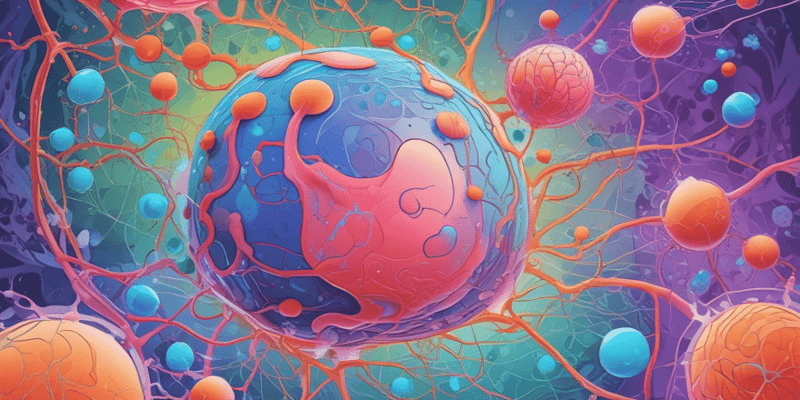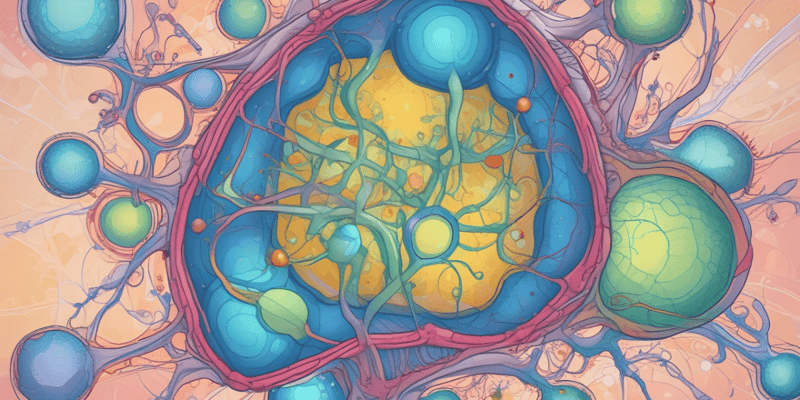38 Questions
What are the three types of stem cells in an adult's bone marrow?
Hematopoietic, endothelial, and mesenchymal stem cells
What do endothelial stem cells give rise to?
Endothelial cell types that line blood and lymph vessels
What is the process in which a cell changes into another cell type?
Cell differentiation
What do hematopoietic stem cells give rise to?
Red blood cells, white blood cells, and platelets
What is the term for stem cells that give rise to keratinocytes in the epidermis of skin?
Epithelial stem cells
What is the term for the process by which a less specialized cell develops or matures to possess a rather distinct form and function than it previously was?
Cell differentiation
What are the different types of stem cells isolated from the oral cavity?
Alveolar bone marrow-derived mesenchymal stem cells, dental follicle progenitor cells, and dental pulp stem cells
What do mesenchymal stem cells give rise to?
Different types of muscle cells
What is the main characteristic of a totipotent stem cell?
Ability to differentiate into any of the cells needed to enable an organism to grow and develop
What happens when a stem cell divides?
It can continually divide and regenerate new stem cells
What is the main difference between a pluripotent stem cell and a multipotent stem cell?
Pluripotent stem cells have a wider range of potential differentiation
What is the final stage of stem cell specialization?
Unipotent
What is the primary function of a multipotent stem cell?
To differentiate into different types of cells within a given cell lineage
What is an oligopotent stem cell limited to?
Becoming one of a few different cell types
At what stage of a human's life are stem cells present?
At different stages of a human's life
What is a characteristic of embryonic cells that arise from the division of the zygote?
They are totipotent
What is the term used to describe a reversible type of commitment during cell differentiation?
Specification
What is the main difference between specification and determination during cell differentiation?
Reversibility of commitment
What is the process in which a cell irreversibly commits to a particular cell fate?
Cell fate determination
How do two daughter cells originated from a single parent cell have different fates?
Due to internal asymmetrical distribution of molecules
What is the result of asymmetric cell division (ACD)?
Two daughter cells with different fates
What is true about the DNA content of different cell types in an organism?
Different cell types have the same DNA content
Which cell type is an exception to the generalization that different cell types have the same DNA content?
Lymphocytes
What happens to the genetic material of erythrocytes during differentiation?
It is lost
What is the primary mechanism by which genes are turned 'on' or 'off'?
Through transcription factors
What is the result of asymmetric cleavage in terms of gene expression?
Different gene expression programs in both daughter cells
What is the role of polarity proteins in asymmetric division?
To position the angle of the mitotic spindle
What is the primary function of transcription factors?
To bind to specific genes on the DNA molecule and either promote or inhibit their transcription
What is the result of inductive signaling in cell differentiation?
Cellular differentiation
What is the purpose of cell differentiation?
To manipulate genes that will be expressed
What is the function of cytoplasmic components in asymmetric cell division?
To partition cell fate determinants
What is the result of short-range signaling between cells?
Cellular differentiation
What is the primary way inducer cells interact with responder cells?
Through direct cell to cell interaction
What is the capacity of dental pulp stem cells (DPSCs)?
To differentiate under appropriate conditions into different somatic cell types of the three germ layers
What is the result of monocyte-derived dendritic cells differentiation?
Cells that aid with inflammation and infection
What is the term for the process of a cell changing into another cell type?
Differentiation
What is one of the types of differentiation that dental pulp stem cells can undergo?
Osteogenic differentiation
What is the result of myeloid differentiation?
The formation of white blood cells
Study Notes
Types of Stem Cells
- Stem cells are divided into several categories according to their potential to differentiate
- Totipotent stem cells have the potential to differentiate into any of the cells needed to enable an organism to grow and develop
- Pluripotent stem cells have the potential to differentiate into any type of human tissue but cannot support the full development of an organism
- Multipotent stem cells have the potential to differentiate into different types of cells within a given cell lineage or small number of lineages
- Oligopotent stem cells are limited to becoming one of a few different cell types
- Unipotent cells are fully specialized and can only reproduce to generate more of its own specific cell type
Sources of Stem Cells
- Embryonic stem cells of the embryo
- Fetal stem cells of the fetus
- Adult stem cells in the adult
- Epithelial stem cells, which give rise to keratinocytes in the epidermis of skin
- Adult bone marrow has three distinct types of stem cells:
- Hematopoietic stem cells, which give rise to red blood cells, white blood cells, and platelets
- Endothelial stem cells, which give rise to endothelial cell types that line blood and lymph vessels
- Mesenchymal stem cells, which give rise to different types of muscle cells
- Dental tissue-derived mesenchymal stem cells (hDT-MSCs)
- Alveolar bone marrow-derived mesenchymal stem cells (ABMSCs)
- Dental follicle progenitor cells (DFPCs)
- Dental pulp stem cells (DPSCs)
- Gingival-derived mesenchymal stem cells (GMSCs)
- Periodontal ligament stem cells (PDLSCs)
- Stem cells from the apical papilla (SCAP)
- Stem cells from human exfoliated deciduous teeth (SHED)
- Tooth germ progenitor cells (TGPCs)
Cell Differentiation
- Differentiation is a biological process in which a less specialized cell develops or matures to possess a rather distinct form and function
- Cell differentiation is based on how dividing cells alter their phenotypic or functional type
- The process of cell differentiation is based on how dividing cells alter their phenotypic or functional type
- Molecular basis of cell differentiation
Stages of Cell Differentiation
- Specification: a reversible type of commitment
- Determination: an irreversible commitment
- Differentiation: the process in which a cell changes into another cell type
Cell Fate Determination
- The process in which a cell irreversibly commits to a particular cell fate
- Internal: asymmetrical distribution of the molecules
- External: inductive signalling (microenvironment)
Mechanisms of Cell Differentiation
- Asymmetric cell division (ACD) results in the development of two daughter cells with different fates after a single mitosis
- Inductive signalling (microenvironment)
- Transcription factors: proteins that bind to specific genes on the DNA molecule and either promote or inhibit their transcription
Types of Differentiation
- Adipocytes (fat cells) differentiation
- Osteogenic differentiation
- Osteoblast differentiation
- Keratinocyte differentiation
- Blood cell differentiation
- Monocyte differentiation
- Myeloid differentiation
- Induced pluripotent stem cells (IPSC) differentiation
- Cancer differentiation
- Red blood cell differentiation
- White blood cells differentiation
Learn about the different types of stem cells, including embryonic, fetal, and adult stem cells, and their functions in the human body.
Make Your Own Quizzes and Flashcards
Convert your notes into interactive study material.
Get started for free



